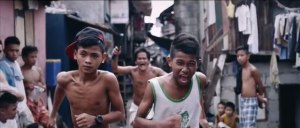Slumdawg Reformist
21 Oct 2012 (Sun) at 6:19 pm Edgar Allan Paule 2 comments
Not Giving In
Artist: Rudimental feat. John Newman and Alex Clare
Director: Josh Cole
Cast: Allen Añas, Tugo Cunanan, Ereson Catipon, Arsell Dela Cruz
2012
Rudimental‘s music video, “Not Giving In,” has much in common with Dangerous Minds, Music of the Heart, City of God, even Sister Act and all those other inspirational movies that goad the youth to choose art over drugs and violence, that reaffirm creativity as the path to freedom from one’s sordid political and economic chains. It begins with two brothers in the Manila slums, borne to a degenerate father and an abused mother. The two (happily) subsist on petty thievery, an inseparable tag team of sorts.
Somewhere in the video, the brothers’ paths diverge, literally─one is drawn into gang violence, while the other discovers a breakdancing barkada. The parallelism is sustained until the end of the video, where both characters take literal and figurative falls: one slips on the dance floor, while the other gets shot in retaliation.
The final message is simple and clear. When you choose violence, you die. When you dance, you get back up and keep on going.
The video is beautiful. Great direction, great cinematography, and definitely, great music. The texture is outstanding, the editing smart, all in all a very cohesive and persuasive production. Of course, it’s always interesting to see the Philippines from the perspective of benevolent foreigners. It’s a source of pride for many Filipinos to see their country and existence recognized by the rest of the world, whether it’s seeing Manila in The Bourne Legacy or Charice on Glee. The Rudimental video is no exception. It’s a well-made video that’s sympathetic to the country’s poverty and recognizes its talent—a rare combination for a nation that’s so used to getting a negative reputation abroad.
Somehow though, for me, it left a bitter aftertaste.
First off, let us recognize the exotic appeal of this video. The gritty texture is so lush, the crane shots so staggering. Supplanted by the inspirational storyline, even fellow Filipinos cannot help but be awed by the beauty of the spectacle. It’s a hyperreal Manila, viewed from flying cameras and God’s eye perspectives. The choice of deviant imagery, moreover, is very universalized “ghetto,” emphasizing skinheads, tattoos, guns, and hip-hop style that are as much Brooklyn as they are Manila and London and Tokyo and Rio de Janeiro. Add the Brit soundtrack and the destitute Filipino slums are given a certain upscale sheen, a cosmopolitan flavor that is simultaneously so Manila and non-Manila. The commonalities of poverty and gangsterism in the world have never appeared so unified—and as a result, on a whole different level, universally appealing.
Second, and more problematic, is the video’s theme. One cannot assail the topic of poverty, given that the video was based on the true story of Bboy Mouse, a multi-awarded UK-based B-Boy champion who has a cameo in the video itself. Couched within its beautiful technicals and well-structured narrative, however, is a very limited and simplistic perspective on poverty and culture.
It must be emphasized that the reasons for poverty in the Philippines are complex. It is a nation plagued by neo/colonial rule and the anarchy of ruling-class bureaucrats, who maintain a foothold on everything from oil prices to what Filipinas are allowed do with their lady parts. Feudalism and foreign exploitation in the countryside contribute to the growing number of urban poor, as seen in “Not Giving In,” who are likewise displaced in violent demolitions to give way to gentrified condominiums and shopping malls.
In contrast to the complexity of the Philippine situation, the thematic statement of “Not Giving In” is paradoxically simple: art equals retribution, gang violence equals certain death. The oversimplification of the dilemma is unsettling.

A taste for the politically-charged: Poverty juxtaposed with historic Edsa on Rudimental’s official website. (Click to enlarge.)
For the more privileged kids (who, in the Philippines, are probably the few who have access to emerging UK musicians like Rudimental) that do not live on a hand-to-mouth existence, the choice between dancing and gangsterism is primarily a matter of deviance, perhaps a decadent pastime or a streak of hooliganism and machismo. But for the down-and-out poor, the implications of this choice run much deeper. In ghettos and slums all over the world, the rationale for joining gangs hinges not on mere thrill. Gangs are political and economic entities, and—like fraternities, the counterpart of gangs in bourgeois culture—are sustained because they assure members of certain survival in the world.
At the moment of the two boys’ separation, the choice between dancing and violence seems so effortless, even accidental. One may argue that it’s poetic license, given that brevity is essential in a music video; that is completely valid. However, we must also recognize that the device’s implications on the video’s message are profound. And that is the root of my unease.
The choice between a life of dance and a violence-ridden lumpen existence is not simple, and the Rudimental video paints a beautiful, convincing and impelling picture to think otherwise.
Centuries earlier, Europeans “discovered” the Philippines and began to export its natural resources under the auspices of colonialism. Today, in the age of social media, the Philippine government exports Filipinos themselves as human capital, manning (excellently!) the world’s households, hospitals and construction sites as a matter of economic policy. And Filipino talents, like Charice, Maria Aragon, and in this case, a young Manileño breakdancer, are likewise “discovered” and plucked from YouTube obscurity by gatekeepers like Oprah and Ellen (and on a smaller scale, Rudimental), the much-coveted break that leads them closer to certain economic upliftment.

The discourse of discovery: Rudimental on “discovering” the young star of their video. Taken from their official Facebook page. (Click to enlarge.)
Yet in a nation where citizens—many of whom are greatly talented—remain in poverty and obscurity, success stories like Bboy Mouse and Charice are the exceptions rather than the norm. The message of “Not Giving In,” while universal and inspirational, is also a little naïve, and should be taken with a grain of salt.
The portrayal of dance versus gangsterism in “Not Giving In” does not recognize or even challenge the systemic ills that breed poverty, miseducation and violence, an atmosphere that dissuades the pursuing of talents (or encourages their monetization) in the first place. While that may be too deep an understanding of Philippine culture to expect from a foreign artist, nonetheless the problematique remains: that this beautiful video, like a poison apple, may inadvertently become an effective tool that ultimately promotes a liberal reformist perspective on life, an approach that recognizes the existence of an untenable system, but does not do anything to challenge it. #

Foregrounding poverty: A portrait of Manila on Rudimental’s single cover. “We were told by the local production that all the large slums in Manila had been cleared out and burnt down by the government over the last six months,” said director Josh Cole in an interview. “We thought this was very strange but I had no reason to doubt it.”
Entry filed under: Edgar Allan Paule, Foreign films, Music videos, Uncategorized. Tags: Alex Clare, Allen Añas, Arsell Dela Cruz, bboy, Bboy Mouse, breakdancing, deviance, discovery, Edsa, Ereson Catipon, exoticism, gangs, gangsterism, John Newman, Josh Cole, manila, philippines, reformism, Rudimental, slums, Tugo Cunanan, urban poor, violence.
2 Comments Add your own
Leave a comment
Trackback this post | Subscribe to the comments via RSS Feed







1. Nan Santamaria (@nansan) | 25 Oct 2012 (Thu) at 4:59 pm
Nan Santamaria (@nansan) | 25 Oct 2012 (Thu) at 4:59 pm
Amen
2. Sanjee | 26 Dec 2013 (Thu) at 8:02 pm
Sanjee | 26 Dec 2013 (Thu) at 8:02 pm
Thanks for this article, as soon as finished watching the video I began searching for critiques, and yours was the only one I found – but a fantastic one at that!
It sums up the uneasy feeling I had the whole way through..